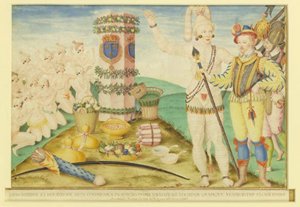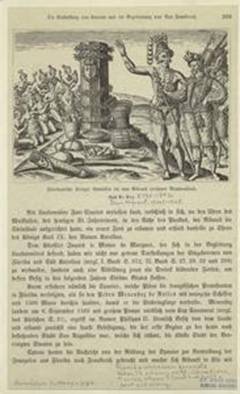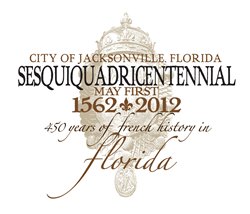In February 1562, two vessels departed from Le Harve on the northern coast of France. These ships, commanded by Jean Ribault, a Huguenot, were bound for Spanish Florida. In late April 1562, Ribault sighted the east coast of Florida, somewhere in the vicinity of Anastasia Island. On May 1, 1562, his ships entered the St. Johns River, which he named the River of May, near modern-day Jacksonville, Florida.
 After spending a few days exploring the river, meeting with local native peoples, and erecting a stone monument to establish French claim to the region, Ribault and his men sailed further north along the coast.
After spending a few days exploring the river, meeting with local native peoples, and erecting a stone monument to establish French claim to the region, Ribault and his men sailed further north along the coast.
In an historical perspective, the French landing in Jacksonville in 1562 predates the settling of Jamestown by 45 years and occurred 58 years before the Mayflower arrived.
Jacksonville and its surrounding communities are very proud of this heritage and we encourage you to learn more about this history.
There are many publications and informational sites that detail Ribault’s arrival in 1562. You can access many of these in the Resource Library.
The True Discouerie of Terra Florida by Jean Rubaut
From a manuscript copy in the British Museum (original spelling left intact.)
View a digital copy from the University of Florida Digital Collection.
 Whereupon, having diligently wayed up our ancres and hoist up saile, with synd and will we sailed and eewed the coast all along with an inspeakable pleasure of thoderiferous smell and bewtye of the same. And because there appeared unto us no sine of any porte, abowt the setting of the sonne, we cast ancre again, which don, we did behond to and fro the goodly order of the woodes wherewith God hathe decked everywhere the said lande. Then perceving towardes the northe a leaping and breking of the water, as a streme falling owt of the lande unto the sea, forthwith we sett again up saile to duble the same while it ws yet daye And as we had so don, and passed byonde yt, there appeared unto us a faire enter (ye) of a great river, which caused us to cast ancre agen and tary there nere the lande, to thende that the next morning we myghy see what it was. And thought that the wynd blewe for a tyme vehemently to the shore warde, yet the hold and auncordge is so good there, that one cable and one ancre held us gast withowt driving or sliding.
Whereupon, having diligently wayed up our ancres and hoist up saile, with synd and will we sailed and eewed the coast all along with an inspeakable pleasure of thoderiferous smell and bewtye of the same. And because there appeared unto us no sine of any porte, abowt the setting of the sonne, we cast ancre again, which don, we did behond to and fro the goodly order of the woodes wherewith God hathe decked everywhere the said lande. Then perceving towardes the northe a leaping and breking of the water, as a streme falling owt of the lande unto the sea, forthwith we sett again up saile to duble the same while it ws yet daye And as we had so don, and passed byonde yt, there appeared unto us a faire enter (ye) of a great river, which caused us to cast ancre agen and tary there nere the lande, to thende that the next morning we myghy see what it was. And thought that the wynd blewe for a tyme vehemently to the shore warde, yet the hold and auncordge is so good there, that one cable and one ancre held us gast withowt driving or sliding.
He next daye in the morning, being the first of Maye, we assaied to enter the porte with two rowe barges and a boate well trymed, finding littell watter at the entrye and many surges and brekinges of the waer which might have astuned and caused us to retourn backe to shippborde if God had not speedily brought us in, where fynding fourthwith 5 or 6 fatom water, entered in to a goodly and great river, which as we went we found to increase still in depth and lardgnes, boylling and roring through the multytute of all sortes of fishes. Thus entered we perceived a good number of the Indians, inhabytantes there, coming alonge he sandes and seebanck somewhat nere unto us, withowt any taken of feare or dowbte, shewing unto us the easiest landing plae, and thereupon we giving them also our parte tokens of assurance and frendelynes, fourthewith one of the best appearance amones them, brother unto one of there kings or governours, comaunded one of the Indians to enter into the water, and to approche our boates, to showe us the easiest landing place. We seeing this, withowt any more dowbting or difficulty, landed, and the messenger, after we had rewarded him with some loking glases and other pretty things of smale value, ran incontently towards his lorde, who forthwith sent me his girdell in oken of assurance and ffrendship, which girdell was made of red lether, aswell couried and couilored as is possible. And as I began to go towards him, he sett fourthe and came and receved me gentlye and reiosed after there mannour, all his men folowing him with great silence and modestie, yea, with more than our mem did. And after we had awhile with gentill usage congratulated with with him, we fell to the grownd a littell waye from them, to call upon he name of God, and to beseche him to contrynewe still his goodness towards us, and to bring to the knoweledg of our Savior Jsus Christ this pooer people While we were thus praying, they sitting upon the grownd, which was dressed and strewed with baye bowes, beheld and herkened unto us very attentively, withowt eyther speaking or moving. And as I made a sygne unto their king, lifting up myne arme and stretching owt one finger, only to make them loke up to heavenward, he likewise lifting up his arme towards heven, put fourthe two fingers wherby it semed that he would make us tunderstand that thay worshipped the sonne and mone for godes, as afterward we understode yt so. In this meane tyme there number ncreased and thither came the kings brother that wsa ffirst with us, their mothers, wifes, sisters and children, and being thus assembled, thaye caused a greate nombre of baye bowes to be cut and therwith a place to be dressed for us, distant from theirs abowt to ffadom; for yt is thee mannour to parle and bargain sitting, and the chef of them to be aparte from the meaner sorte, with a shewe of great obedience to their kings, superyours, and elders. They be all naked and of goodly stature, mighty, faire and as well shapen and proportioned of bodye as any people in all he worlde, very gentill, curtious and of a good nature.
The most parte of them cover their raynes and pryvie partes with faire harts skins, paynted cunyngly with sondry collours, and the fore parte of there bodye and armes paynted with pretye devised works of azure, r3edd, and black, so well and so properly don as the best painter of Europe could not amend yt. The wemen have their bodies covered with a cewrten herbe like unto moste, wherof the decertrees and all other trees be always covered. The men for pleasure do always tryme themselves therwith, after swundry fassions. They be of tawny collour, hawke nosed and of pleasaunt countenaunce. The women be well fabored and modest and will not suffer that one approche them to nere, but we were not in theire howses, for we saw e none at that tyme.
After we had tarried in his northe side of the river the most parte of the daye, which river we have now called by the name of the river of Maye, for that we discovered the same the ffirst day of that mounthe congratulated and made alyance and enered into amytie with them, and presented theire kinge and his brethren with gownes of blewe clothe garnished with yellowe flowers de luce, yt semed hey were sorry for our departure, so that most parte of them entered into the watter up to the nece, to sett our barges on flote, putting into us soundry kindes of ffishes, which with a marvelus speed they can to take them in their parkes ,made in the watter with great redes, so well and cunyngly sett together, after the fashion of a labirinthe or maze with so many tourns and crokes, as yt is impossible to do yt with more cunning or indusrye.
But desiring to imploye he rest of the daye on the other side of this river, so veue and knowe those Indians we sawe there, we traversed thither and withowt any diffycutye landed amonges them, who received us very gentgelly with greawt humanytie, putting us of there fruites even in our boates, as mulberries, respices and suche other frutes as they found redely by the waye.
Some after this there came thither there kynge with his brethren and others, with bowes and arrows in their hands, using therewithal a good and grave ffasion and behavior, right souldier like with as warlikd a bouldnes as might be. They were naked and paynted as thothers, there hear likewise long, and trussed up with a lace made of hearbes, to the top of there hedes, but they had neither their wives nor children in here company.” …
